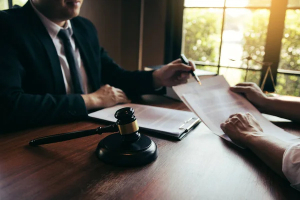


Facing an Assault With A Deadly Weapon (ADW) charge in San Jose can be overwhelming. It's a serious offense, and the consequences can impact your life significantly. The legal system can be perplexing and intimidating. However, having an experienced San Jose ADW lawyer by your side can make a difference.
At Summit Defense, we're dedicated to ensuring you get the best representation. Our team understands the gravity of such charges. We also know that every case has its unique circumstances. If you have been charged with aggravated assault causing serious bodily injury, you need an experienced San Jose violent crimes lawyer to represent you. Our San Jose assault attorney can provide you with a strong defense against this criminal offense.
Learn more about our law firm below, and get in touch with our criminal defense lawyers for a free consultation.

A. Initial Consultation and Case Evaluation
Your journey begins with a consultation. This is where our lawyers get a firsthand account of your situation. We listen to your side of the story, taking note of every detail. This is an opportunity for us to gauge the strengths and challenges of your assault with a deadly weapon case. In this initial phase, our primary aim is to make you feel understood and reassured.
After understanding the specifics of your assault case, we offer preliminary legal advice. Our attorneys provide clarity about the legal process ahead. And most importantly, we lay the groundwork for building a solid defense strategy for you.
B. Legal Research and Case Building
Every case demands thorough research. It's not just about knowing the facts but understanding the nuances that surround them. Our team delves deep into the specifics of your situation, meticulously examining every angle.
Using our vast resources, we cross-reference with similar cases and statutes, including California Penal Code 245(A)(1). In the second phase of case building, we gather evidence, speak to witnesses, and determine the best arguments that will stand in court. With this comprehensive research, we ensure that we're fully equipped to build a watertight defense for you.
C. Negotiating With the Prosecution
Before even stepping into a courtroom, there's ample room for negotiation. Our seasoned attorneys enter into discussions with the prosecution, armed with the facts of your case. These negotiations focus on arriving at a resolution that minimizes the impact on you. This could mean reduced charges or even getting them dropped entirely.
But that's not where it ends. We also strategize on how best to present your case should negotiations not yield the desired outcome. Every negotiation, every dialogue, is a step towards safeguarding your freedom and ensuring your rights remain uncompromised.
D. Representation in Court
The courtroom can be intimidating, but not when you have Summit Defense by your side. We know the importance of making your voice heard, and our lawyers ensure it resounds clearly. They represent you passionately, making every argument count while challenging every piece of evidence that isn't in your favor.
But beyond the legal jargon and procedures, we also prioritize making the courtroom experience less daunting for you. Our attorneys explain the process, keep you updated, and ensure you're prepared for every hearing. With Summit Defense representing you, rest assured you're never alone in the courtroom.
E. Developing a Strong Defense Strategy
A robust defense strategy is more than just reacting to the prosecution's claims; it's about being two steps ahead. We analyze the evidence, understand the narratives, and identify where the opposition might focus. Armed with this knowledge, we craft a plan tailored to your case. This isn't a one-size-fits-all approach, but instead, a strategy tailored to your unique situation.
Our strategy doesn't just focus on highlighting inconsistencies in the prosecution's case but also on underscoring your narrative. Whether it's through witness testimonies, evidence presentation, or legal arguments, our goal remains unchanged: to secure the best possible outcome for you.
You need an experienced attorney to fight for you. Even having a misdemeanor assault conviction on your criminal record can change your life forever. You are entitled to a proper defense, so reach out to us today for a consultation.
Assault With a Deadly Weapon is more than just physical harm. It involves using a weapon that could cause severe injury or death. The weapon's nature isn't restricted to guns or knives. Even everyday objects can be considered deadly if used with intent, particularly against a police officer.
The state of California treats ADW charges seriously. The presence of a weapon intensifies the offense. It's not just about causing harm. It's about the potential threat a weapon introduces into the equation. Our law offices are here to help you, so reach out to our San Jose assault lawyer today for a case consultation.
California Penal Code 245(A)(1) defines the crime. It states that anyone who commits assault using a deadly weapon or exerting force likely to result in great bodily injury is guilty. The weapon can be anything that could lead to a major injury, not just firearms.
This statute highlights the state's stance on ADW. It doesn't just punish the act but the intent, too. A simple argument can escalate into an ADW charge if a weapon is involved. Being aware of this is essential to navigate the legal landscape.

To charge someone with ADW, certain elements must be present. First, there must be an intentional act. This act should involve a deadly weapon. Then, the act must induce fear in the victim.
However, actual injury isn't required for an ADW charge. The mere act, coupled with intent and a weapon, is enough to lead to charges. For the prosecution to succeed, they must prove these elements beyond a reasonable doubt. As a defendant, challenging these elements can form a vital part of your defense.
At the heart of an ADW charge lies intent. The accused must have had a clear intention to harm. It's not just about wielding a weapon. The prosecution must show purposeful action aimed at causing fear or injury.
But remember, intent can be subjective. What might seem harmful to one might be harmless to another. This subjectivity allows room for defense. Challenging the prosecution's claim of intent can weaken their case.
What constitutes a deadly weapon? It's not just about guns or knives. A baseball bat, a bottle, or even a car can qualify. The weapon's nature plays a crucial role in determining the severity of the charge.
However, not all objects are inherently deadly. Their use during the act determines their classification. It's essential to understand this distinction. It can mean the difference between a severe or a lesser charge.
How the victim perceives the act is vital. Did they genuinely feel threatened? Or was there a misunderstanding? Victim perception can influence the case significantly, and we can dive into this issue.
It's essential to consider this perception. A genuine threat versus a perceived one can vary. Understanding this difference can aid in crafting a solid defense.

ADW charges in California carry heavy penalties. Conviction can lead to jail time, fines, or both. The severity of the punishment often depends on the weapon used and the circumstances. The misdemeanor conviction could lead to a year in jail and a fine of $1,000, but the felony form could lead to multiple years in jail and a fine of $10,000.
However, consequences extend beyond the legal realm. A conviction can affect job prospects and relationships. It's not just about the present but the future, too. This makes having a strong defense even more critical.

Defending against ADW charges requires strategy. There are several avenues to explore. Some defenses challenge the act itself. Others focus on the circumstances surrounding it.
For instance, maybe it was self-defense. Or perhaps the accused had no intent to harm. Understanding these defenses can pave the way for a favorable outcome. Here are some common defenses:
Self-defense is a potent argument. If the accused acted to protect themselves, it's valid. The key lies in proving a genuine threat. The response should also be proportionate to the threat.
However, it's not just about claiming self-defense. Evidence and witnesses can bolster this claim. If the threat was real and immediate, it can justify the accused's actions.
Protecting a loved one is instinctive. If the accused acted to safeguard someone else, it's valid. Like self-defense, the threat should be genuine. And the response should be proportional.
Evidence plays a crucial role here. Witnesses or surveillance footage can support the claim. It's about proving that the accused's actions were necessary.
No intent, no crime. If the accused had no intention to harm, it's a strong defense. This challenges the prosecution's primary claim. It can lead to reduced charges or even dismissal.
However, establishing a lack of intent can be tricky. It's about creating doubt in the prosecution's narrative. And that requires a skilled defense attorney.
Wrong place, wrong time. Sometimes, innocent people get accused. Mistaken identity is a real issue. Surveillance footage, alibis, or witnesses can support this defense.
It's about proving that the accused wasn't the perpetrator. Establishing an alibi can dismantle the prosecution's case. Being clear about your whereabouts at the time of the incident is essential.
The burden of proof is for the prosecution to bear. If they can't prove the charge beyond a reasonable doubt, the defense wins. Challenging evidence or its absence is a solid strategy.
Questioning the authenticity of evidence is crucial. Or highlighting gaps in the prosecution's narrative. Every piece of unverified evidence weakens their case.
In ADW cases, deadly weapons aren't just firearms or knives. It can be any object used in a way that might cause serious harm or death.
The cost varies based on the case's complexity and the lawyer's experience. We will always give you a clear and transparent quote, so reach out to us today.
The duration varies. Simple cases might resolve in months. More complex cases can take years. Consult with your lawyer for a better estimate.

Navigating an ADW charge in San Jose without proper representation isn't wise. The stakes are high, and the consequences are lasting. Summit Defense is committed to ensuring your rights are protected. With our expertise, you have the best chance for a favorable outcome.
Don't face this challenge alone. Legal battles are daunting, but with the right help, they're manageable. Our San Jose Assault With A Deadly Weapon lawyers are ready to assist. Call us today and take the first step toward securing your future.
Rabin Nabizadeh is a dedicated criminal defense attorney with extensive experience in both Federal and State courts. He has successfully represented clients in cases ranging from Misdemeanor DUI and Theft to serious felonies such as Grand Theft, Burglary, Sex Crimes, and Murder. Notably, Mr. Nabizadeh possesses a unique understanding of Immigration Law, allowing him to adeptly navigate cases with both criminal and immigration consequences. Fluent in Hebrew and Farsi, he also enjoys playing classical guitar in his spare time.
LEARN MOREPhone:
(408) 792-4200
Contact us now for a
free consultation
580 California Street, 12th Floor
San Francisco, CA 94104
1970 Broadway, Suite 1145
Oakland, CA 94612
2570 N 1st Street, 2nd Floor
San Jose, CA 95131
533 Airport Blvd, Suite 400
Burlingame, CA 94010
6200 Stoneridge Mall Road, Suite
300 Pleasanton, CA 94588
370 Convention Way Suite 316
Redwood City, CA 94063
500 Capitol
Mall Sacramento, CA 95814